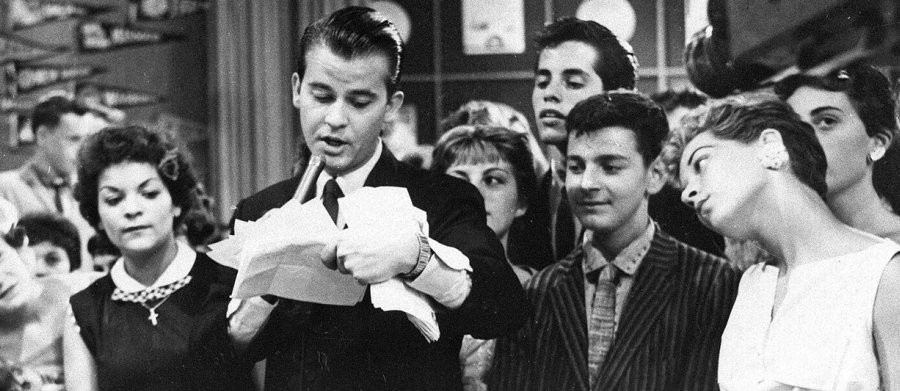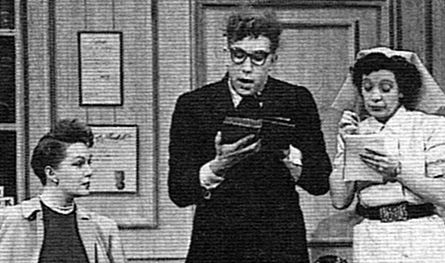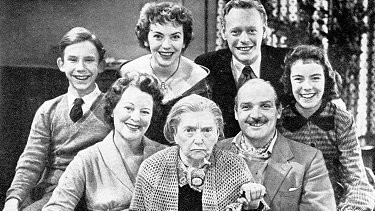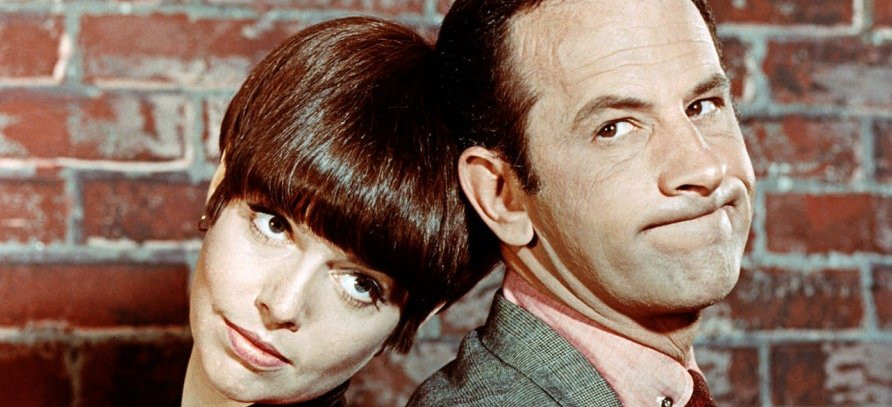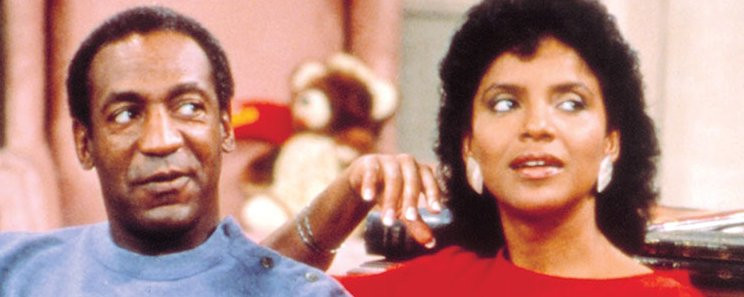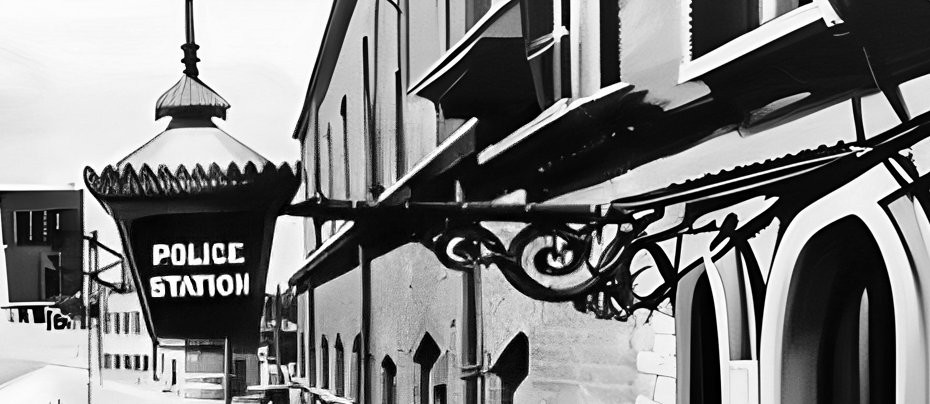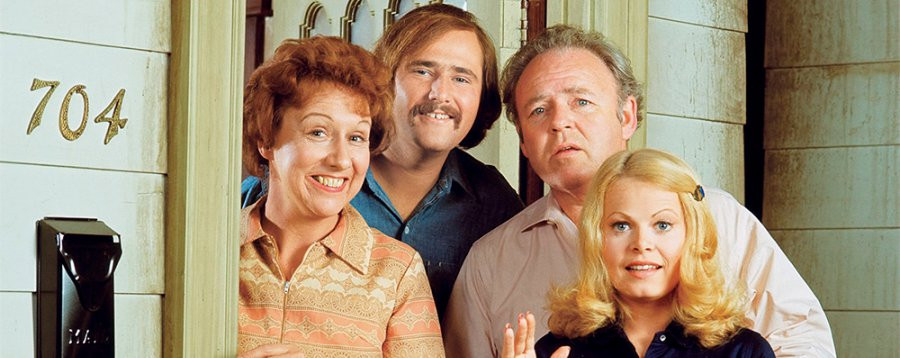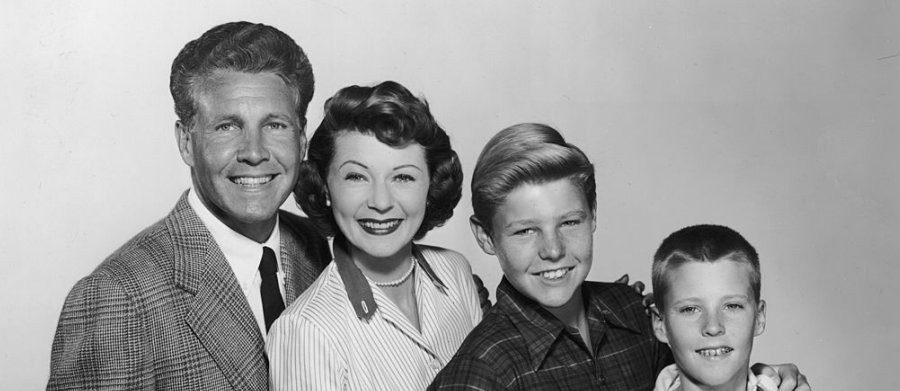
The Adventures of Ozzie and Harriet
1952 - United StatesReview: Michael Spadoni
Ozzie and Harriet Nelson seemed to be the perfect American family. They were good people with two well-behaved sons, a clan you would be proud to know and emulate. Critics called them boring, banal, and dull. Maybe so. But in the more conformist 1950's, following the crowd wasn't a bad thing to do. And The Adventures of Ozzie and Harriet wasn't a bad sitcom either.
Years before Seinfeld was hailed as "the show about nothing", Ozzie Nelson and his writers took slices of the Nelson's home life and turned them into pleasant television entertainment. And at a time when rock and roll was considered by some as "the devil's music", son Ricky (later Rick) made it acceptable to plenty of teens and their parents; the fact that Ozzie backed his son's music was a signal that maybe rock wasn't all just Elvis and the pelvis after all.
Oswald George Nelson was born 20 March 1907 in Jersey City, New Jersey. He earned a law degree from Rutgers University. But starting in the 1930’s, he formed an orchestra that had a fair amount of popularity. In 1932, Ozzie hired a singer for his band, a beauty pageant winner named Harriet Hilliard (born Peggy Lou Snyder in Des Moines, Iowa on 18 July 1914). Ozzie and Harriet fell in love and married in 1935; the pair later had two sons-David and Ricky.
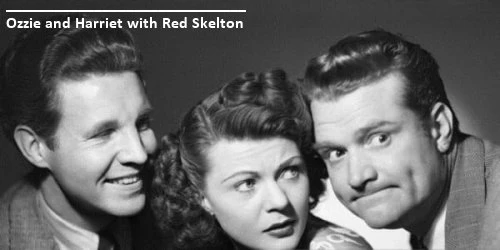
Starting in the 1940's, Ozzie Nelson's band (and singer Harriet) appeared on Red Skelton's weekly radio show; during the programme, Ozzie and Harriet would engage in funny banter about married life and their children. That act led to a spin-off, not a musical programme, but a situation comedy. In 1944, CBS began airing The Adventures of Ozzie and Harriet; with actors playing the voices of their sons, it was based on the real-life antics of the real Nelson family-Ozzie as the bandleader and dad; Harriet as housewife; David and Ricky as themselves. It was a hit.
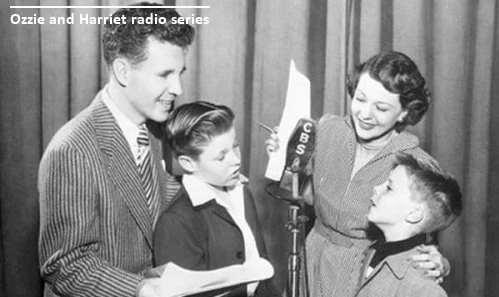
By 1949, Ozzie (who produced, directed and co-wrote the radio show) allowed thirteen-year old David and nine-year old Ricky to play themselves on the series. Also that year, Ozzie signed a 10-year contract, moving the radio show to the weaker ABC radio network. (Ozzie's legal skills paid off; the contract required ABC to pay the Nelson family for the entire length of the contract, whether the family had a programme on the air or not). ABC also needed hits for its fledgling television network and felt Ozzie and Harriet would be a success on video. To test the theory, Ozzie came up with a film version of the radio series; the 1951 Here Come the Nelsons made Ozzie an ad executive but otherwise stuck to the radio show's format. Featuring an up-and-coming actor named Rock Hudson, the movie was a hit. ABC was convinced, and The Adventures of Ozzie and Harriet moved to television in the fall of 1952. The radio show continued for two more years; separate scripts were written for the radio and video versions.
Ozzie had his hand in everything-producing, directing, and co-writing the scripts with his brother Don and other talented scribes of the period. The TV series was shot on 35 millimetre film (a trend that became popular with the success of I Love Lucy); he even showed episodes to audiences to record their laughter. Viewers truly believed Ozzie and Harriet was a chronicle of the real-life Nelson family's own experiences; in fact, Ozzie fostered the impression by taking incidents that happened to them and turning them into TV scripts. Viewers never knew what or if Ozzie worked for a living; he was seen just hanging around the house, talking to his neighbours or having a chat with Harriet and the boys.
Though never a top-ten hit for the third-ranked ABC, The Adventures of Ozzie and Harriet was one of the network's more popular comedies. And the ratings rose after the Nelson's youngest son took up rock and roll.
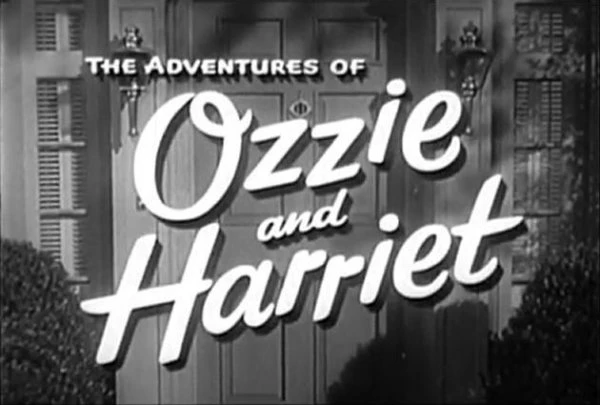
As the story goes, a teenage girl Rick was dating was a big fan of Elvis Presley. To impress her, Rick boasted that he would cut his own record. Turning to dad Ozzie for help, Rick signed a deal with Verve Records. The first single for the young Nelson was a cover of Fats Domino's hit I'm Walkin'. In April 1957, Rick performed the song on an episode entitled Ricky The Drummer. Soon after the show aired, the Rick Nelson version of I'm Walkin' sold a million copies! It was a gold mine made in video heaven. From that point on, Rick would sing his latest single on “Ozzie and Harriet”, pushing sales higher (along with the show's ratings). He soon signed for Imperial records (the same label that Domino recorded for) and his first Imperial single, Be-Bop Baby was released in late September of that same year. From 1957 until 1963, Rick Nelson would hit the US pop charts over and over again with songs such as Hello Mary Lou; Travelin' Man, Poor Little Fool, and Fools Rush In - well written, well produced and very well performed singles. (Historians agreed; Rick Nelson was later inducted into the Rock and Roll Hall of Fame).
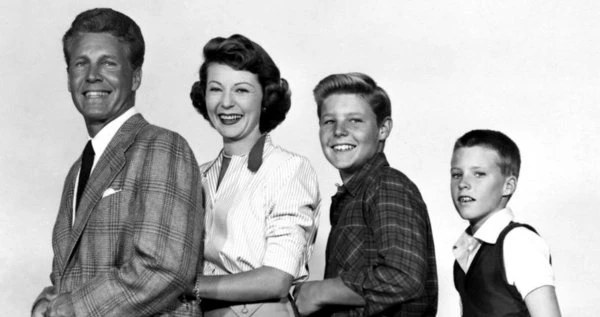
Some “Ozzie and Harriet” episodes also featured filmed segments of Rick performing a song, an early version of today's music videos. The fact that rock and roll was performed on the sitcom (with Ozzie's blessing) helped legitimize the genre for many parents who were appalled by the gyrations of Elvis Presley. Rick was a clean-cut boy who stood in one place while singing lyrics parents could understand. This is not meant to slight Rick's true musical talent; in fact, Rick Nelson helped broaden the US audience for rock music.
As the 1960's beckoned, “Ozzie and Harriet” put more focus on the growing boys; both David and Rick attended college, became lawyers (not unlike dad) and married; David's real-life wife June Blair and Rick's spouse Kristin Harmon soon became featured players on the series. But as everyone got older, the plots became more familiar and the ratings began to fall. After a 22 year run on both radio and television, the end finally came for "America's favourite family, the Nelsons."
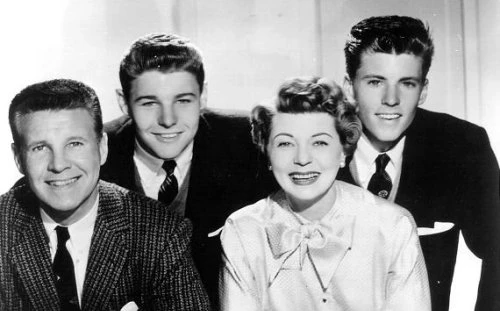
In January 1966, ABC moved the show to Saturdays from its familiar Wednesday night timeslot to make way for the cult hit Batman. The final episode of The Adventures of Ozzie and Harriet aired on 3 September 1966. For longevity, it had virtually no peer; “Ozzie and Harriet” lasted for 14 years and 435 episodes on television, making it the longest-running live situation comedy in American television history. (Note the word "live": The animated antics of The Simpsons now holds the record as the longest-running half-hour comedy series in America).
Life was less kind to the real-life Nelson family after “Ozzie and Harriet” ended its run. Ozzie tried to recapture the popularity of the old series with a syndicated 1973 comedy called Ozzie's Girls, where two college co-eds rented David and Rick's old rooms in the Nelson home. It lasted one season.
Ozzie Nelson died on 3 June 1975. Harriet Nelson went into semi-retirement, and died in October 1994. David Nelson remained active in commercial production. But Rick's musical career took a downturn after “Ozzie and Harriet” left the airwaves; he made a brief comeback with the 1972 hit Garden Party and turned to country music, but couldn't recapture the popularity of his early rock days. Rick Nelson died in a plane crash in 1985.
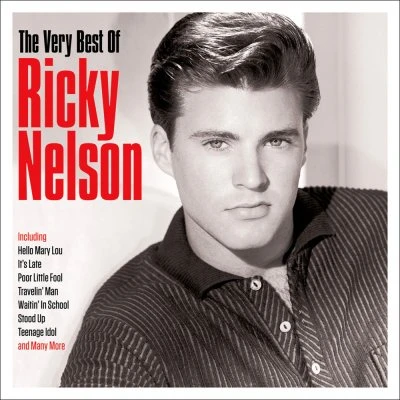
For many Americans in the 1950's, The Adventures of Ozzie and Harriet was a pleasant half-hour comedy featuring very likeable people. Not as broad as "Lucy" or as gritty as The Honeymooners, Ozzie and Harriet was more a reflection of what Americans wanted to be. We all wanted to have the ideal family. And for many, the Nelsons were just that.
Seen this show? How do you rate it?
Seen this show? How do you rate it?
Published on July 4th, 2020. Written by Michael Spadoni for Television Heaven.


